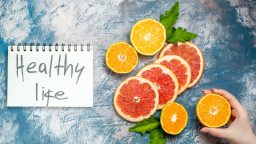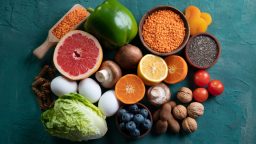When it comes to maintaining healthy, glowing skin, many people focus on topical skincare products, such as moisturisers, serums, and sunscreens. While these products can certainly play a role in skin care, the true foundation of skin health begins with what you put inside your body. The food you eat has a significant impact on the condition of your skin, influencing everything from its appearance to its ability to repair itself. In this article, we’ll explore the connection between diet and skin health, highlighting the nutrients that support a clear, youthful complexion and the foods that may contribute to skin issues.
The Impact of Diet on Skin Health
Your skin is the body’s largest organ, and it’s constantly exposed to environmental factors such as pollution, UV rays, and harsh weather conditions. In order to protect and repair itself, the skin requires the right nutrients, hydration, and support from within. A balanced diet rich in vitamins, minerals, antioxidants, and healthy fats can enhance the skin’s natural ability to heal, regenerate, and defend against damage. Conversely, poor dietary choices, such as consuming excess sugar, unhealthy fats, or processed foods, can negatively affect your skin, leading to issues like acne, inflammation, and premature aging.
Key Nutrients for Healthy Skin
- Antioxidants: Protecting Skin from Damage
Antioxidants are compounds that help neutralise harmful free radicals in the body, which are unstable molecules that can damage skin cells and accelerate the aging process. Free radicals can be caused by environmental stressors like pollution, UV exposure, and even internal processes such as metabolism. By consuming antioxidant-rich foods, you can help protect your skin from oxidative stress and promote healthy, youthful-looking skin.
- Vitamin C: This powerful antioxidant is crucial for collagen production, which helps maintain skin’s firmness and elasticity. It also helps protect the skin from UV damage and promotes the healing of damaged skin. Foods high in vitamin C include citrus fruits, strawberries, bell peppers, broccoli, and spinach.
- Vitamin E: Known for its ability to protect the skin from oxidative damage and improve skin texture, vitamin E is another potent antioxidant. You can find vitamin E in foods like almonds, sunflower seeds, avocado, and spinach.
- Healthy Fats: Nourishing and Hydrating Skin
Healthy fats, especially omega-3 fatty acids, play a crucial role in maintaining the skin’s barrier function and keeping it hydrated. A lack of essential fatty acids can lead to dry, irritated skin and make it more prone to inflammation.
- Omega-3 fatty acids: These healthy fats help reduce inflammation, support the skin’s moisture barrier, and can even protect against the harmful effects of UV exposure. Omega-3s are found in fatty fish (like salmon, mackerel, and sardines), flaxseeds, chia seeds, and walnuts.
- Monounsaturated fats: Found in foods like avocados, olive oil, and nuts, these fats help maintain the skin’s elasticity and support its natural moisture levels, keeping the skin soft and supple.
- Vitamin A: Promoting Skin Renewal
Vitamin A, particularly in the form of retinol, is essential for skin cell turnover and repair. It helps promote the production of new skin cells, which is crucial for maintaining a youthful appearance and preventing the buildup of dead skin cells that can contribute to clogged pores and acne.
- Beta-carotene: The body converts beta-carotene, found in foods like carrots, sweet potatoes, and leafy greens, into vitamin A. This antioxidant helps keep the skin healthy and supports its natural ability to regenerate.
- Retinoids: Retinoids, the active form of vitamin A, are often used in skincare products for their ability to reduce wrinkles, improve skin texture, and treat acne. You can also obtain retinoids from foods like eggs, liver, and dairy products.
- Zinc: Healing and Protecting Skin
Zinc is an essential mineral that supports the skin’s immune function, helps with wound healing, and reduces inflammation. It plays a role in collagen production and helps protect the skin from oxidative stress, making it an important nutrient for maintaining healthy skin.
- Food sources of zinc: Zinc is found in foods like pumpkin seeds, shellfish, chickpeas, lentils, and cashews. It is especially beneficial for people with acne, as it can help regulate oil production and reduce inflammation in the skin.
- Water: Hydrating and Detoxifying
Proper hydration is key to maintaining healthy, radiant skin. When the body is dehydrated, the skin can become dry, flaky, and more prone to fine lines and wrinkles. Drinking enough water helps flush out toxins, supports skin cell regeneration, and keeps the skin plump and hydrated.
- Hydrating foods: In addition to drinking water, you can also hydrate your skin with water-rich foods like cucumbers, watermelon, oranges, and celery. These foods provide both hydration and essential nutrients for healthy skin.
Foods That Can Harm Your Skin
While many foods can support skin health, some may contribute to skin issues when consumed in excess. Here are a few dietary factors that can negatively impact your skin:
- Excess Sugar: Diets high in sugar and refined carbohydrates can lead to an increase in insulin levels, which can trigger inflammation and breakouts. Consuming too much sugar can also contribute to the process of glycation, where sugar molecules attach to collagen and elastin, leading to wrinkles and sagging skin. To promote healthy skin, try to limit your intake of sugary snacks, sodas, and processed foods.
- Dairy: Some studies suggest that dairy products, particularly milk, can exacerbate acne in certain individuals. While the link between dairy and acne is still debated, people who are sensitive to dairy may notice an improvement in their skin after reducing or eliminating dairy products from their diet.
- Trans Fats and Unhealthy Fats: Consuming high amounts of trans fats (found in processed foods, fried foods, and baked goods) and unhealthy fats can lead to inflammation, which can exacerbate conditions like acne and eczema. Instead, focus on healthy fats, such as those from avocados, nuts, and fatty fish.
- Processed and Junk Foods: Diets high in processed and junk foods, which are often loaded with unhealthy fats, sugar, and salt, can contribute to inflammation and skin issues. Eating a diet high in these foods can lead to acne, dull skin, and premature aging.
Tips for a Skin-Healthy Diet
- Eat a Variety of Colorful Fruits and Vegetables: Aim to eat a rainbow of fruits and vegetables every day to ensure you’re getting a wide range of antioxidants, vitamins, and minerals that support skin health.
- Choose Whole Grains: Whole grains, such as quinoa, brown rice, and oats, provide fiber and essential nutrients without the blood sugar spikes caused by refined grains.
- Limit Processed Foods and Sugars: Reduce your intake of processed foods, sugary snacks, and sugary beverages to avoid inflammation and glycation, both of which can harm your skin.
- Incorporate Healthy Fats: Include omega-3-rich foods like fatty fish, flaxseeds, and chia seeds, as well as monounsaturated fats from avocado and olive oil to nourish your skin from within.
- Stay Hydrated: Drink plenty of water throughout the day and consume hydrating foods like cucumbers, watermelon, and citrus fruits.
Conclusion
Diet plays a crucial role in maintaining healthy skin, as the nutrients you consume directly influence the appearance and function of your skin. By focusing on a balanced diet rich in antioxidants, healthy fats, vitamins, and minerals, you can support your skin’s natural ability to heal, regenerate, and protect itself. At the same time, limiting foods that cause inflammation, such as excess sugar, processed foods, and dairy, can help prevent skin issues and promote a clear, radiant complexion. So, nourish your skin from the inside out by making healthy food choices that support your skin’s health and vitality.





